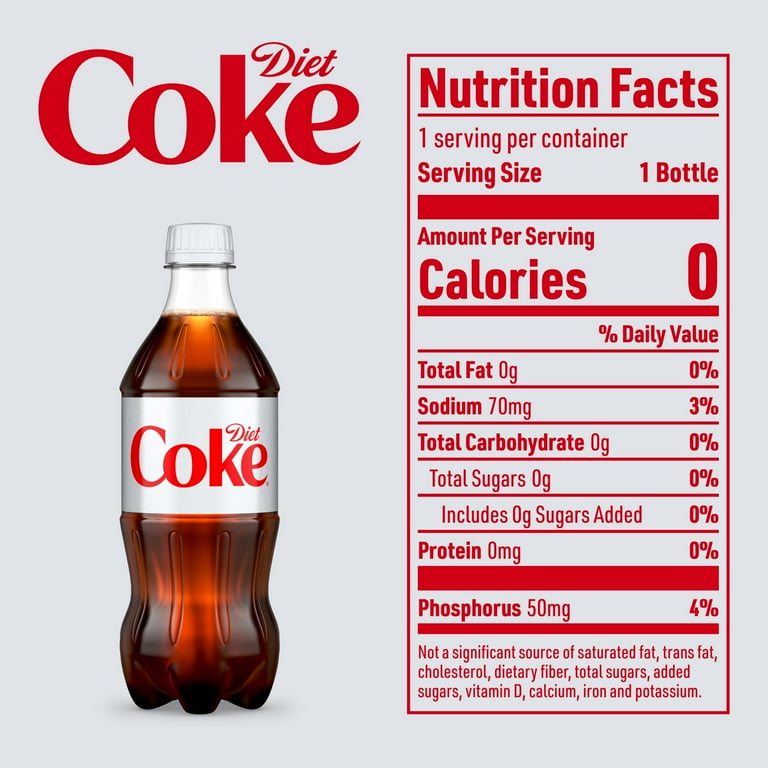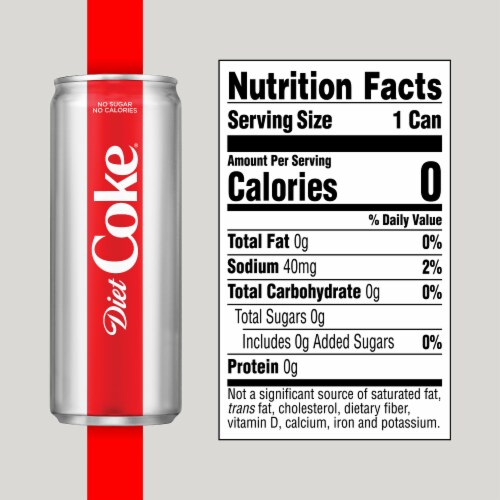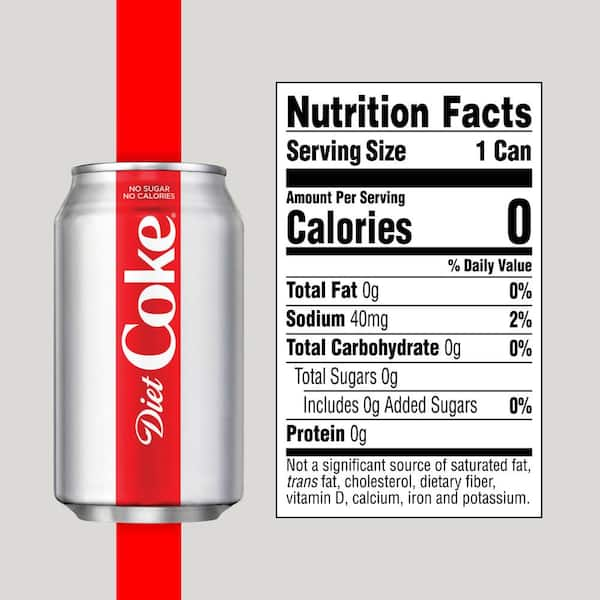Are you curious about what’s really inside your favorite fizzy drink? If Diet Coke is your go-to beverage, you’re not alone.
Many of us reach for its refreshing taste without a second thought. But have you ever stopped to consider the nutrition data behind that iconic silver can? Knowing what you’re consuming is key to making informed choices, and that’s exactly what this article will help you do.
We’ll dive into the numbers, exploring calories, ingredients, and everything in between. Get ready to uncover the secrets of Diet Coke and learn how it fits into your lifestyle. Stick around, because the information might surprise you!
Calorie Content
Diet Coke contains zero calories, offering a guilt-free drink option. It appeals to those mindful of calorie intake. Ideal for maintaining a balanced diet.
When you reach for a can of Diet Coke, you might wonder about its calorie content. The good news is, Diet Coke is a popular choice for those looking to enjoy a refreshing beverage without the extra calories. But what does this mean for your daily diet and lifestyle choices? Understanding the calorie content can help you make informed decisions.Calorie-free Enjoyment
Diet Coke boasts zero calories. This makes it an attractive option if you’re counting calories or trying to maintain a healthy weight. You get the fizz and flavor without the calorie burden. This zero-calorie feature is a key reason many choose Diet Coke over regular soda.How It Fits Into Your Diet
If you’re aiming to cut down on calories, Diet Coke can fit seamlessly into your diet plan. Imagine enjoying your favorite meals without worrying about adding extra calories from your drink. Have you ever thought about how many calories you can save in a week just by switching to Diet Coke?Is It Too Good To Be True?
You might wonder how Diet Coke can have no calories. The secret lies in its artificial sweeteners. These provide sweetness without adding calories, allowing you to enjoy the taste without guilt. Are you curious about how these sweeteners work? They trick your taste buds without affecting your waistline.Practical Considerations
While Diet Coke offers a zero-calorie alternative, balance is key. It’s important to consider other nutritional aspects of your diet. Are you getting enough nutrients from other sources? Make sure Diet Coke complements a well-rounded diet rather than replacing healthier options.Your Personal Experience
Have you ever felt the satisfaction of sipping a cold Diet Coke without the worry of calorie overload? It’s a small pleasure that fits well into busy lifestyles. Sharing a can with friends or enjoying it during a meal can make everyday moments a little more enjoyable. How does Diet Coke fit into your routine? Understanding the calorie content of Diet Coke can enhance your beverage choices. It’s about enjoying the flavors you love while being mindful of your diet. What do you think about incorporating Diet Coke into your lifestyle?Sugar-free Formula
Diet Coke is a popular choice for those avoiding sugar. Its sugar-free formula makes it stand out. This drink offers the classic cola taste without the added sugars. Many people enjoy it as a guilt-free indulgence. Let’s explore what makes this formula special.
What Is A Sugar-free Formula?
A sugar-free formula means no sugar is added. This reduces calorie intake. It also makes the drink suitable for diabetics. Diet Coke achieves sweetness through artificial sweeteners. These provide the sweet taste without the calories.
Artificial Sweeteners Used
Diet Coke uses aspartame and acesulfame potassium. Aspartame is a common artificial sweetener. It is about 200 times sweeter than sugar. Acesulfame potassium adds a similar sweetness level. Together, they create a balanced, sweet flavor.
The sugar-free formula keeps calories low. A can of Diet Coke contains zero calories. This appeals to those monitoring calorie intake. It offers a refreshing option without extra energy consumption.
Impact On Blood Sugar Levels
The absence of sugar means no blood sugar spike. This is crucial for people with diabetes. The sweeteners used do not raise blood sugar. They provide a safe alternative to sugary drinks.
Why Choose Sugar-free?
Choosing sugar-free drinks has benefits. It supports weight management goals. It also helps in reducing the risk of cavities. For many, it is a healthier choice.
Artificial Sweeteners
Artificial sweeteners have changed how we think about sweet drinks. Diet Coke is popular because it has no sugar yet tastes sweet. The secret lies in its artificial sweeteners. These ingredients make Diet Coke a choice for those who want fewer calories.
Aspartame Details
Aspartame is a key ingredient in Diet Coke. It’s a low-calorie sweetener used widely. Aspartame is much sweeter than regular sugar. This means only a small amount is needed. It does not add calories to the drink. Aspartame is made from two amino acids. These are building blocks of protein. It breaks down into these amino acids and methanol in the body. Methanol is found in fruits and vegetables too. The FDA and other groups say aspartame is safe. But some people avoid it due to health concerns.
Potential Health Impacts
Many studies have looked at aspartame’s health effects. Some link it to headaches or mood changes. Others found no strong evidence of harm. Aspartame can be a concern for people with phenylketonuria (PKU). PKU is a rare genetic disorder. These people can’t process phenylalanine well. Aspartame contains phenylalanine, so they should avoid it. Most people can safely enjoy Diet Coke in moderation. It’s important to stay informed and make personal choices.
Caffeine Levels
Diet Coke contains about 46 mg of caffeine per 12-ounce can. This is lower than the caffeine in coffee. Keep an eye on your caffeine intake for better health.
Caffeine Levels in Diet Coke When you reach for a can of Diet Coke, you’re likely looking for that fizzy refreshment, but have you ever wondered about its caffeine content? Caffeine is a key ingredient in many soft drinks, and Diet Coke is no exception. Knowing the caffeine levels can help you make informed choices about your beverage consumption.Comparison With Other Beverages
Diet Coke contains about 46 milligrams of caffeine per 12-ounce can. How does this compare to other popular drinks? A standard cup of coffee can have anywhere from 95 to 200 milligrams of caffeine, which is significantly higher. Even a can of regular Coca-Cola has slightly less caffeine, around 34 milligrams. You might be surprised to learn that some energy drinks contain over 200 milligrams of caffeine in a single serving. So, when you sip on Diet Coke, you’re getting less caffeine than many other options, which might be a relief if you’re trying to cut down on your caffeine intake.Effects On Health
Have you ever felt jittery after drinking too much caffeine? This is a common reaction for many people. While Diet Coke’s caffeine content is moderate, consuming several cans a day can add up. Excessive caffeine can lead to sleep disturbances, increased heart rate, and even anxiety. But in moderation, caffeine can boost your energy and alertness. Understanding your body’s tolerance to caffeine is crucial. Ask yourself: How does caffeine affect your daily routine? If you’re sensitive to caffeine, it might be worth tracking your intake. Diet Coke can be a part of your balanced diet, but it’s important to enjoy it responsibly.Sodium Content
Diet Coke remains a popular beverage choice for many. Its refreshing taste appeals to those seeking a calorie-free drink. One important nutritional aspect of Diet Coke is its sodium content. Understanding sodium levels is crucial for maintaining a healthy diet.
Daily Recommended Intake
Sodium plays a key role in our body. It helps regulate fluid balance and supports nerve function. Health experts suggest a daily sodium intake of less than 2,300 mg. This amount equates to about one teaspoon of salt. Excessive sodium can lead to health issues.
Diet Coke contains a modest amount of sodium. A 12-ounce can has around 40 mg of sodium. This amount is relatively low compared to the daily recommended limit. Consumers can enjoy Diet Coke while easily staying within sodium guidelines.
Health Considerations
Too much sodium can impact health negatively. High sodium intake links to high blood pressure. This condition increases the risk of heart disease and stroke. Monitoring sodium levels in drinks and foods is important.
For those watching sodium intake, Diet Coke offers a low-sodium option. It fits well into a balanced diet when consumed in moderation. Individuals with specific health concerns should consult with healthcare providers. They can provide personalized advice on sodium consumption.
Acid Content
Diet Coke, a popular soft drink, is known for its refreshing taste. Many don’t realize its acid content plays a significant role in its flavor. This acid content can have various impacts on health, particularly dental health. Understanding the acidity levels in Diet Coke can offer insights into how it compares with other beverages.
Impact On Dental Health
Diet Coke contains carbonic acid and phosphoric acid. These acids can soften tooth enamel. Softened enamel becomes more prone to erosion. Dental erosion can lead to cavities and sensitivity. Regular consumption of acidic drinks can increase this risk. Dentists often recommend limiting intake to protect teeth. Rinsing with water after drinking can help. This simple step can minimize acid damage.
Acidity Levels Compared
Diet Coke’s acidity is similar to other sodas. Its pH level is around 3.2. This is quite acidic compared to water, which has a pH of 7. Lemon juice is even more acidic than Diet Coke. It has a pH of around 2.3. Understanding these levels helps in making informed choices. Knowing the acidity can guide you in dietary decisions. Reducing acidic drinks can promote better oral health.
Nutritional Label Analysis
Diet Coke is a favorite among soda lovers who watch calories. The nutritional label offers insights into what you consume with each sip. Understanding this label can help make informed choices. This analysis breaks down the key components of the Diet Coke nutritional label.
Key Nutrient Information
Diet Coke contains zero calories. A significant benefit for calorie-conscious individuals. It also has no sugar. Thanks to artificial sweeteners like aspartame. Sodium content is about 40 milligrams per serving. This is relatively low compared to other sodas. Caffeine is present at 46 milligrams per 12-ounce can. This provides a slight energy boost. The drink is also free of fats and proteins.
What To Look For
Check the sodium level on the label. While low, it contributes to daily intake. Monitor your caffeine consumption. Diet Coke adds to your daily caffeine total. Pay attention to the artificial sweeteners used. Some people have sensitivities. Consider the absence of calories and sugar. This makes it a popular choice for those limiting these nutrients.

Credit: www.walmart.com
Dietary Considerations
When thinking about your daily beverage choices, Diet Coke often pops up as a popular option. But how does it fit into your dietary plan? Whether you’re counting calories or managing health conditions, understanding the nutritional data of Diet Coke is crucial. Let’s explore some dietary considerations to help you make informed choices.
Suitability For Various Diets
Diet Coke is a zero-calorie drink, which makes it a go-to choice for those on calorie-restricted diets. If you’re watching your weight, this can be a refreshing alternative to sugary sodas. Keto enthusiasts might appreciate it too, as it contains no carbohydrates. But is it suitable for everyone?
While Diet Coke fits well into certain diets, consider how it aligns with your overall health goals. Some people prefer to avoid artificial sweeteners, like aspartame found in Diet Coke. If you’re aiming for a more natural diet, you might want to weigh the pros and cons before indulging.
Special Health Conditions
If you have specific health conditions, Diet Coke’s nutrition data may raise some questions. For individuals with diabetes, the zero sugar content can seem beneficial. However, it’s essential to consult with your healthcare provider about how artificial sweeteners might impact your health.
For those with digestive concerns, Diet Coke might not be the best choice. Some people report bloating or discomfort after consuming carbonated beverages. Have you ever noticed a similar reaction? Listening to your body can guide you in making the best dietary choices.
Dietary decisions are personal and unique to each individual. What works for one person might not work for another. How do you decide which drinks fit into your lifestyle? Consider your dietary needs and health conditions when choosing Diet Coke or any other beverage. It’s all about finding what aligns with your health goals and comfort.
Consumer Perceptions
Diet Coke is a popular choice for those seeking fewer calories. Many consumers believe it is a healthier alternative to regular soda. But perceptions can vary greatly among individuals. Some focus on its zero sugar content. Others question its overall nutritional value.
Public Opinion
Public opinion on Diet Coke is diverse. Some praise it for being calorie-free. They enjoy the taste and feel guilt-free drinking it. On the flip side, others worry about artificial sweeteners. They fear potential health impacts. This creates a split view among consumers.
Marketing Vs. Reality
Marketing campaigns often highlight Diet Coke’s benefits. They emphasize zero calories and refreshing taste. This can shape consumer perceptions positively. But reality might differ for some. Critics argue that marketing overlooks potential health risks. They point to studies about artificial sweeteners.

Credit: www.harristeeter.com

Credit: www.homedepot.com
Frequently Asked Questions
What Ingredients Are In Diet Coke?
Diet Coke contains carbonated water, caramel color, aspartame, phosphoric acid, citric acid, and caffeine. It also includes natural flavors and potassium benzoate as a preservative. These ingredients create its distinct taste, without adding calories.
How Many Calories Are In Diet Coke?
Diet Coke has zero calories per serving. It uses artificial sweeteners like aspartame to provide sweetness without calories. This makes it a popular choice for those managing calorie intake.
Is Diet Coke Sugar-free?
Yes, Diet Coke is sugar-free. It uses artificial sweeteners, primarily aspartame, to provide sweetness. This allows it to maintain a sweet taste without adding sugar or calories.
Does Diet Coke Contain Caffeine?
Diet Coke contains caffeine, about 46 mg per 12 oz can. This is less than the caffeine in regular Coke, offering a milder energy boost.
Conclusion
Diet Coke offers a refreshing choice for those seeking fewer calories. Its nutrition data shows zero sugar and minimal calories. Perfect for calorie-conscious individuals. It’s important to enjoy Diet Coke in moderation. Balance it with a healthy lifestyle. This drink fits well in a balanced diet.
Remember, hydration is key for health. Consider water as your primary choice. Diet Coke can be a part of your diet. Just keep an eye on intake. Enjoy responsibly and stay informed. Making smart choices leads to better health. Stay mindful of your daily beverage intake.
{ “@context”: “https://schema.org”, “@type”: “FAQPage”, “mainEntity”: [ { “@type”: “Question”, “name”: “What ingredients are in Diet Coke?”, “acceptedAnswer”: { “@type”: “Answer”, “text”: “Diet Coke contains carbonated water, caramel color, aspartame, phosphoric acid, citric acid, and caffeine. It also includes natural flavors and potassium benzoate as a preservative. These ingredients create its distinct taste, without adding calories.” } } , { “@type”: “Question”, “name”: “How many calories are in Diet Coke?”, “acceptedAnswer”: { “@type”: “Answer”, “text”: “Diet Coke has zero calories per serving. It uses artificial sweeteners like aspartame to provide sweetness without calories. This makes it a popular choice for those managing calorie intake.” } } , { “@type”: “Question”, “name”: “Is Diet Coke sugar-free?”, “acceptedAnswer”: { “@type”: “Answer”, “text”: “Yes, Diet Coke is sugar-free. It uses artificial sweeteners, primarily aspartame, to provide sweetness. This allows it to maintain a sweet taste without adding sugar or calories.” } } , { “@type”: “Question”, “name”: “Does Diet Coke contain caffeine?”, “acceptedAnswer”: { “@type”: “Answer”, “text”: “Diet Coke contains caffeine, about 46 mg per 12 oz can. This is less than the caffeine in regular Coke, offering a milder energy boost.” } } ] }

